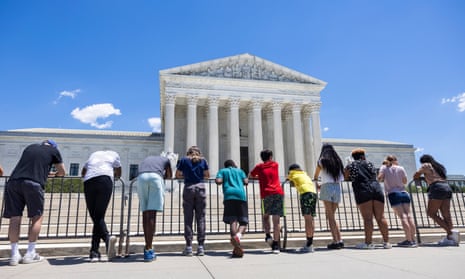The US supreme court should overturn its landmark 1973 Roe v Wade ruling that legalized abortion nationwide, instead letting states decide whether to regulate abortion before a fetus can survive outside the womb, the state of Mississippi argued in papers filed on Thursday with the court.
The filing came as one reproductive rights advocate warned that she believed half of US states would ban abortion altogether if Roe versus Wade was overturned, as anti-abortion extremists gain ground and Republican-dominated state legislatures continue their work of recent years to strip back a woman’s choice.
“Under the Constitution, may a State prohibit elective abortions before viability? Yes. Why? Because nothing in constitutional text, structure, history, or tradition supports a right to abortion,” the Mississippi attorney general, Lynn Fitch, and four of her attorneys wrote in the brief.
The arguments are a direct challenge to the central finding of the court’s 1973 Roe versus Wade decision and its 1992 decision in a Pennsylvania abortion case.
Both rulings said states may not put an undue burden on abortion before viability. The Mississippi attorneys argue that the rulings are “egregiously wrong”.
The Mississippi case is the first big abortion-rights test in a supreme court reshaped with three conservative justices nominated by former president Donald Trump.
A 6-3 conservative majority on the nine-strong bench, with the three Trump nominees, said in May that the court would consider arguments over a Mississippi law that would ban abortion at 15 weeks. Justices are likely to hear the case this fall and could rule on it in the spring.
The supreme court, at the end of its first term with a 6-3 conservative majority, in June decided to uphold the Obama administration’s Affordable Care Act, in a significant ruling. Next term, which begins in October, crucial abortion rights and gun rights cases will be before the court.
Nancy Northup is president and CEO of the Center for Reproductive Rights, a national reproductive rights advocacy group based in New York, which is defending Mississippi’s only remaining abortion clinic in its challenge of the 15-week ban.
She said on Thursday that half of the states are poised to ban abortion altogether if Roe v Wade is overturned.
“Today’s brief reveals the extreme and regressive strategy, not just of this law, but of the avalanche of abortion bans and restrictions that are being passed across the country,” Northup said in a statement.
“Their goal is for the supreme court to take away our right to control our own bodies and our own futures – not just in Mississippi, but everywhere.”
Republican lawmakers in several states have been pushing laws designed to challenge Roe v Wade, including bans on abortion once the first sign of a fetal pulse is detected, which can be as early as six weeks, before many women realize they are pregnant.
A federal district judge on Tuesday blocked an Arkansas law that would ban most abortions, ruling that the law is “categorically unconstitutional” because it would ban the procedure before the fetus is considered viable.
The Mississippi 15-week law was enacted in 2018, but was blocked after a federal court challenge. The state’s only abortion clinic, Jackson Women’s Health Organization, remains open and offers abortions up to 16 weeks of pregnancy.
More than 90% of abortions in the US take place in the first 13 weeks of pregnancy, according to federal data.
The Mississippi clinic has presented evidence that viability is impossible at 15 weeks, and an appeals court said that the state “conceded that it had identified no medical evidence that a fetus would be viable at 15 weeks”.
